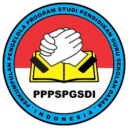Pengajaran Kosakata Bahasa Inggris Melalui Active Learning
Pengajaran Kosakata Bahasa Inggris Melalui Active Learning
Keywords:
vocabulary, active learning, classroom action researchAbstract
This study was focused on the progressive in increasing the quality of students’ vocabulary mastery based on the specific tpics such as color, type of food and beverage, human body, and family members. The material was conveyed through the implementation of Active Learning in the first Grade students of SDN Mulyasari 1, Bandung. This research was conducted into two cycles. The results obtained in the first activity cycle consisted of the teachers’ activities in implementing active learning was about 80% and the amount of class athmosphere was 65.25%. Meanwhile, the evaluation of student learning activities on the assignment sheet reached the average 7.74, 8.78 formative test, and analysis of the vocabulary teaching reached 75%. Meanwhile, in the second cycle, the results obtained by teachers’ activity was 90% and 89.25% for class atmosphere. The average value obtained by students during the assignment sheet is 8.06, the average value of formative test reached 8.96, and the analysis of vocabulary teaching was 85%. Based on the results above, it was clear that the implementation of active learning in mastering English vocabulary would help students in remembering or even mastering that vocabulary. This achievement was inseparable from the use of instructional media and attractive teaching methods for learners.
Downloads
Downloads
Published
How to Cite
Issue
Section
License
Copyright of Journal Naturalistic : Jurnal Kajian Penelitian Pendidikan dan Pembelajaran (e-ISSN:2548-8589, p-ISSN:2528-2921).
Open Access Policy
This journal provides immediate open access to its content on the principle that making research freely available to the public supports a greater global exchange of knowledge.
This journal is open access journal which means that all content is freely available without charge to users or / institution. Users are allowed to read, download, copy, distribute, print, search, or link to full text articles in this journal without asking prior permission from the publisher or author. This is in accordance with Budapest Open Access Initiative.






